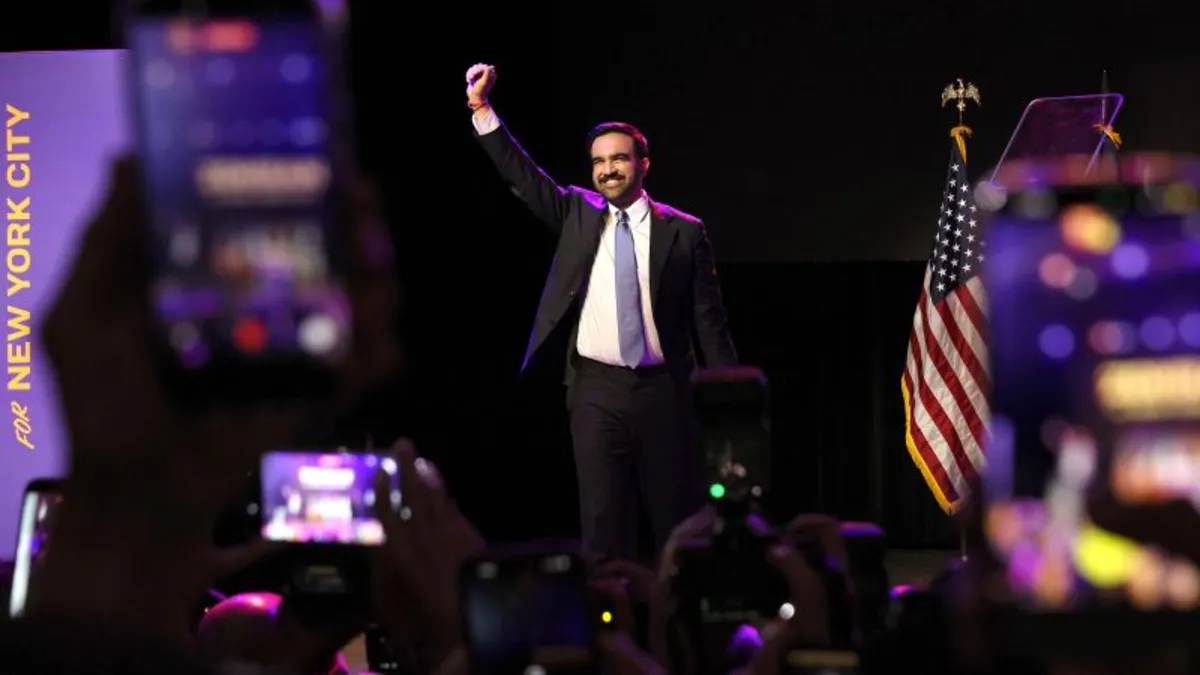
As Zohran Mamdani took the stage for his victory speech on Tuesday night, the atmosphere at Kabab King was electric. The restaurant staff paused their activities, captivated by his words, while the clinking of dining cutlery fell silent. “New York City, breathe this moment in,” Mamdani proclaimed, resonating with the locals who had gathered at his favored biryani spot in the vibrant Jackson Heights neighborhood of Queens. This venue, a staple in the community, has been a frequent stop for Mamdani during his campaign, drawing residents eager to witness the celebration of their new mayor.
“Most people think this is a hole in the wall, but he comes here,” shared Lakshmi Shubha, a Roosevelt Island resident who visited Kabab King with friends. Shortly after being elected New York City’s first Muslim and South Asian mayor, Mamdani delivered a speech in Brooklyn that was rich in personal narrative and deeply rooted in his cultural heritage. “New York will remain a city of immigrants, a city built by immigrants, powered by immigrants, and as of tonight, led by an immigrant!” he declared, prompting applause and cheers from the restaurant patrons.
“We’ve been saying Mamdani Mubarak!” exclaimed Shahrukh Ali, the owner of Kabab King, reflecting the community's enthusiasm. Sameha Jamal, a 21-year-old voter, remarked, “He’s a people’s person for sure. He reminds me what New York City is all about.” This sentiment echoed among many diners, who saw Mamdani’s election as a significant milestone for representation. Jamal's father, also a supporter, expressed concern over some of Mamdani’s policies, particularly regarding rent stabilization. As a small homeowner, he hoped to see more detailed plans to address the potential impact of a rent freeze on property owners like himself.
Other diners articulated their feelings of hope and excitement at witnessing a leader who reflects their identity on a national stage. The diverse demographic of Jackson Heights—where approximately 64% of residents are foreign-born and the community is a melting pot of cultures—amplified this sentiment. According to a report from the NYC Small Business Services, the neighborhood boasts a population that is 50% Hispanic or Latino, 32% Asian, 15% White, and 1% African American.
“In my lifetime, I would not have imagined a city such as New York City, which has faced challenges like 9/11, having a Muslim socialist, South Asian leader gain such prominence and support,” said Sehrish Munir, who voted for Mamdani. “I think it just shows the direction that the young people in our country want to go for.” The support for Mamdani highlights a broader shift in the political landscape, especially among South Asians who historically lean Democratic. According to Karthick Ramakrishnan, executive director of AAPI Data at the University of California, Berkeley, South Asians often identify with the Democratic Party due to its inclusive policies, which resonate beyond race and religion.
While Mamdani’s South Asian identity is a point of pride for many, Munir pointed out that there is also an undeniable essence of New York in his character. “It’s apparent in his beliefs, the way he talks, and the way he approaches people,” she noted. His multilingual campaign efforts reflect the diverse fabric of the city, illustrating how New York City continues to embrace its multicultural identity.